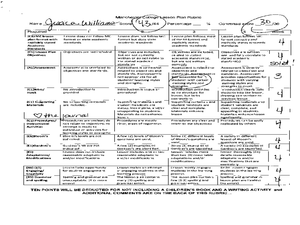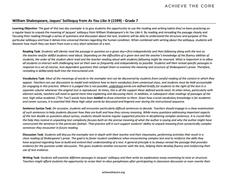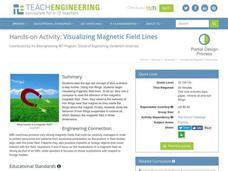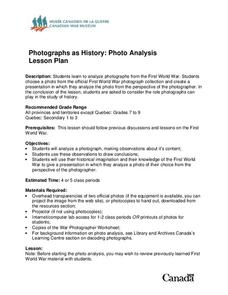Curated OER
Witch Poetry Activity
In this following directions using rhyming words worksheet, pupils observe a picture of a witch and erase parts of her using "if...then" sentences and filling in the blanks with rhyming words about the picture. They fill in the blanks...
Curated OER
Observing and Writing about Butterflies
Students observe and write about butterflies. In this life cycle lesson, students listen to the story The Life of a Butterfly by Robin Bernard and watch a YouTube video of a butterfly coming out of his chrysalis. They complete a...
Curated OER
Observing The Sky
In this space science instructional activity, learners find the words that are related to the observations made of constellations and other related puzzles.
Curated OER
Civilizations of the Ancient Near East
Sixth graders investigate ancient civilizations by creating a research project. In this world history lesson, 6th graders investigate historic civilizations developed close to important rivers of the near East. Students create a...
Curated OER
What is Science?
In this scientific investigation worksheet, students rotate to seven different stations and follow directions for each given investigation. They make observations and answer questions in order to solve the given problems.
Curated OER
Mushroom Counting and Coloring
In this counting and coloring worksheet, students observe spots on a mushroom, count and color according to directions, and determine how many remain uncolored. Students complete six activities.
Curated OER
Watch the Sky: Observing Clouds and Patterns
Students observe clouds outside of the classroom. In this weather activity, students investigate and record the clouds above their classroom everyday for three weeks. The students then analyze their data and discuss what causes specific...
Baylor College
Magnifying and Observing Cells
Though it isn't a novel activity to prepare onion cell and Elodea plant cell slides as examples of cells in a microbiology unit, this resource will leave you thoroughly prepared. As pupils examine the slides that they prepare, they draw...
Curated OER
"As You Like It" by William Shakespeare
Jacque's soliloquy from Act II, scene ii of As You Like It sets the stage for a close reading exercise that models how to approach difficult, dense text and enables readers to practice reading comprehension and analysis skills. Learners...
Curated OER
Observing Chemical Reactions
Start this series of lessons with a bang! Five exothermic reactions are outlined in this resource, including a demonstration that produces both light and sound. In the lab, chemistry apprentices record temperature changes, make hand...
Facing History and Ourselves
How Journalists Minimize Bias
Class members are challenged to write a neutral news story about the events they observe in a short video. After sharing their stories in groups and discussing the different perceptions, the class concludes with a video of journalists...
Curated OER
Time-Lapsed Observations
Students explore timed observations for science investigations. They record ideas on a chart related to a classroom closed terrarium. They repeat their observations for several days and time observations for changing shadows during the...
NOAA
Deep-Sea Ecosystems – Chemosynthesis for the Classroom
Photosynthesis was discovered in the 1770s, but chemosynthesis wasn't discovered until 1977. While many have performed an experiment to show how photosynthesis works, the activity allows pupils to observe chemosynthesis. Scholars set up...
Teach Engineering
Visualizing Magnetic Field Lines
Magnetic fields might not be a field of dreams but they are useful. Class members observe the reactions of magnetic fields using a compass, iron filings in a paper container, and iron filings suspended in mineral oil.
Discovery Education
How's the Weather?
Young meteorologists explore different aspects of the weather while learning about measurement devices. They build instruments and then set up a weather station outside and measure temperature, humidity, air pressure, wind speed, and...
Workforce Solutions
Speed Interviewing
An important part of the job search process is the personal interview. Help pupils prepare with speed interviewing activity—teams of three-act as a job seeker, interviewer, and observer. Every three minutes, participants rotate roles and...
Curated OER
Being Shadowed
What causes a shadow to appear? Have kindergartners and first graders explore shadows with a fun science activity. After reading a short paragraph about light sources, they draw a shadow for a little girl based on the location of the...
BioEd Online
Spiders in Space
Does a spider spin its web differently in space? What other ways might microgravity affect an arachnid? Pick a topic to research, plan an investigation, and follow astronauts on the International Space Station as they perform some of the...
BioEd Online
Butterflies in Space
How does gravity affect the life cycle of a butterfly? Learn first-hand what types of investigations astronauts perform in space by following along with one of NASA's experiments. Create butterfly habitats in the classroom with specific...
Baylor College
What's Is Soil Made Of?
It's time to roll up those sleeves and get a little dirty in the second instructional activity of this series on the science of food. Investigate where plants and animals get the minerals they need to live in this two-part exploration of...
Prince William Network
The Incredible Journey
Divide your school gym into breeding grounds and non-breeding grounds so that your zoologists can play a game simulating the seasonal migration of shorebirds. Players pick one of the included game cards and follow its directions, which...
Canadian Museum of Civilization Corporation
Photographs as History
Imagine being a war photographer embedded in World War I. How do you see your role? How might your photos influence that study of the war? Of history? Class members select a photograph, adopt the perspective of the photographer, and...
Science Matters
Mighty Microorganisms
How can you tell if a microorganism is helpful or detrimental to an ecosystem? Learners inspect slides or pictures of microorganisms and record their observations to identify those that are beneficial or harmful. They then pretend to...
Virginia Department of Education
Three Types of Rocks
Rock out with the second installment of a five-part series on earth materials and processes. Your budding geologists make observations of given rock samples and posit classification systems for rocks. They then learn about the accepted...
Other popular searches
- Euglena Direct Observation
- Eugenia Direct Observation
- Euglenda Direct Observation
- Glenda Direct Observation
- What Is Direct Observation

























